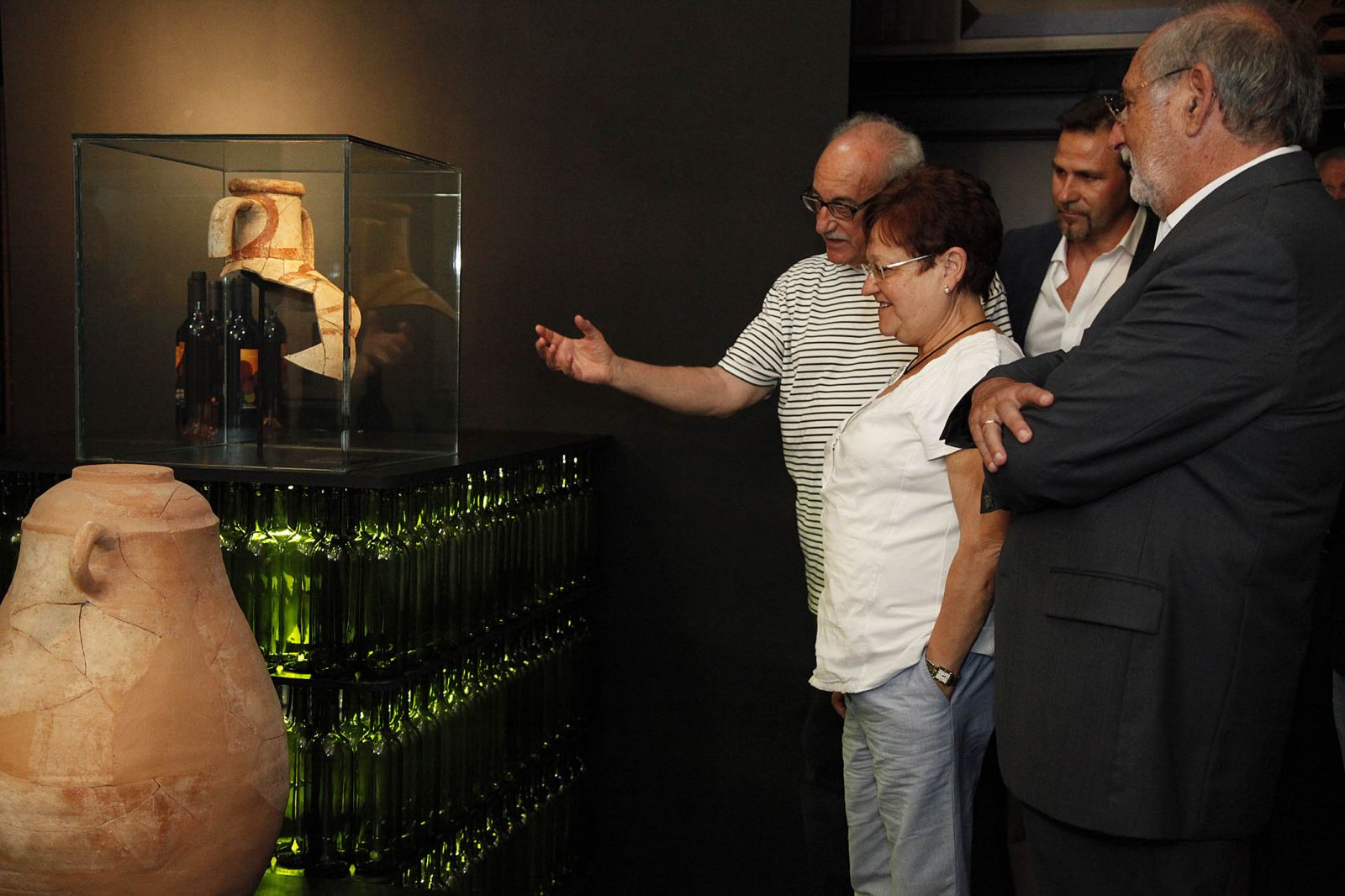
From today, the Sala Noble of the MARQ Library is hosting a new exhibition that offers an overview of the 2,600 year old archaeological journey by the history and evolution of wine in Alicante. The exhibition, which can be visited from tomorrow and until 11 January 2015The exhibition, which includes around a hundred pieces, covers the different stages of its cultivation and production in the province and is promoted by the Alicante Provincial Council and sponsored by the Denomination of Origin Wines of Alicante.
The president of the provincial institution, Luisa PastorThis morning, she presented the exhibition accompanied by the president of the PDO, Antonio Navarroand the commissioner of the same, Emilio Soler. The event was also attended by the deputy for Promotion and Development, Alejandro Morantthe technical director of MARQ, Manuel Olcinaand the mayor of Castalla, Juan Antonio Candelawhose town council has donated a painting.
Pastor stressed that "the exhibition, with a simple but highly original and meaningful layout, takes visitors on a journey through the history of wine growing in Alicante from its origins to the present day."and added that the wine culture in Alicante offers a wide range of possibilities such as the tastings, routes, wineries or vineyards "and now they have the possibility to understand and enjoy one of our great values and learn about its origin, history, peculiarities and the renewed interest in its main varieties.".
Through a The hundred or so pieces, some more than twenty centuries old - amphorae, jars, bottles, glasses, publications and other utensils linked to the cultivation and production of wine - are on display. visitors can get to know the origin of its production in Alicante, in the wine presses of l'Alta de Benimáquia (Dénia) from the 6th century B.C., passing through theIberians, who made the broth at Illeta dels Banyets (El Campello) in the 2nd and 3rd centuries BC, and medieval timeswhen the colonisation of the lands of the new Kingdom of Valencia allowed for a unprecedented expansion of the vineyards. Alicante was then committed to the vine and in the 15th century it consolidated its growth with the massive production of wine for local consumption.
"It is the first time that Alicante recovers its happy wine-making past through an exhibition in our land, in this case in the best museum of the province; the MARQ."said Antonio Navarro, who added that ".in this exhibition the visitor will be able to relive the main milestones of the presence of wine in Alicante, its importance in the Alicante society from the ancient civilisations to the Middle Ages or the Renaissance; the adventure of our travelling wines, the socio-economic development of the whole province in the 19th century before the tourist model now established or the long curriculum of our wines in the royal houses.".
The exhibited works belong to the MARQ and other archaeological museums in the province such as those of Dénia and Alcoy, al Museum of Arts and Crafts in Monóvar or to the Alicante Municipal Archives. The pieces include several large jars, including one that is 2,600 years old, amphorae, bottles, casks, barrels, bottle corkers, goblets and grape seeds from the 15th century.
The wine exhibition enriches the exhibition Deltebre I. The story of a shipwreck which will be presented at MARQ next Monday and which arises as a result of the discovery of a bottle of alicante wine on a sunken ship two hundred years ago in the Ebro Delta. This bottle will be displayed in the exhibition "Wines in Alicante"from this Wednesday.
This initiative of the Museum of Archaeology of Catalonia (MAC) and the Alicante Wines Designation of Origin, encouraged the Alicante provincial institution to join in, through the MARQ, and to promote another exhibition, in this case focusing exclusively on wine in Alicante.
In this respect, the President of the Provincial Council emphasised that has been made an effort to present this monographic exhibition dedicated to the wine of our land so that the public can understand the magnitude that our wines have achieved throughout history, with an international projection that has made them great ambassadors of our province.
Finally, the curator of the exhibition has reiterated the the economic and cultural importance of wine in Alicante's history because, he explained, "For many centuries the fundamental wealth of the province was wine production which, after being practically paralysed due to plagues, was relaunched in 1932 with the recognition of the Protected Designation of Origin Vinos de Alicante.". "Since then, thanks to the efforts of the DO and the historical acceptance of its importance, we have witnessed a renaissance of the wine until today, where eleven million bottles are produced annually. "He concluded.
